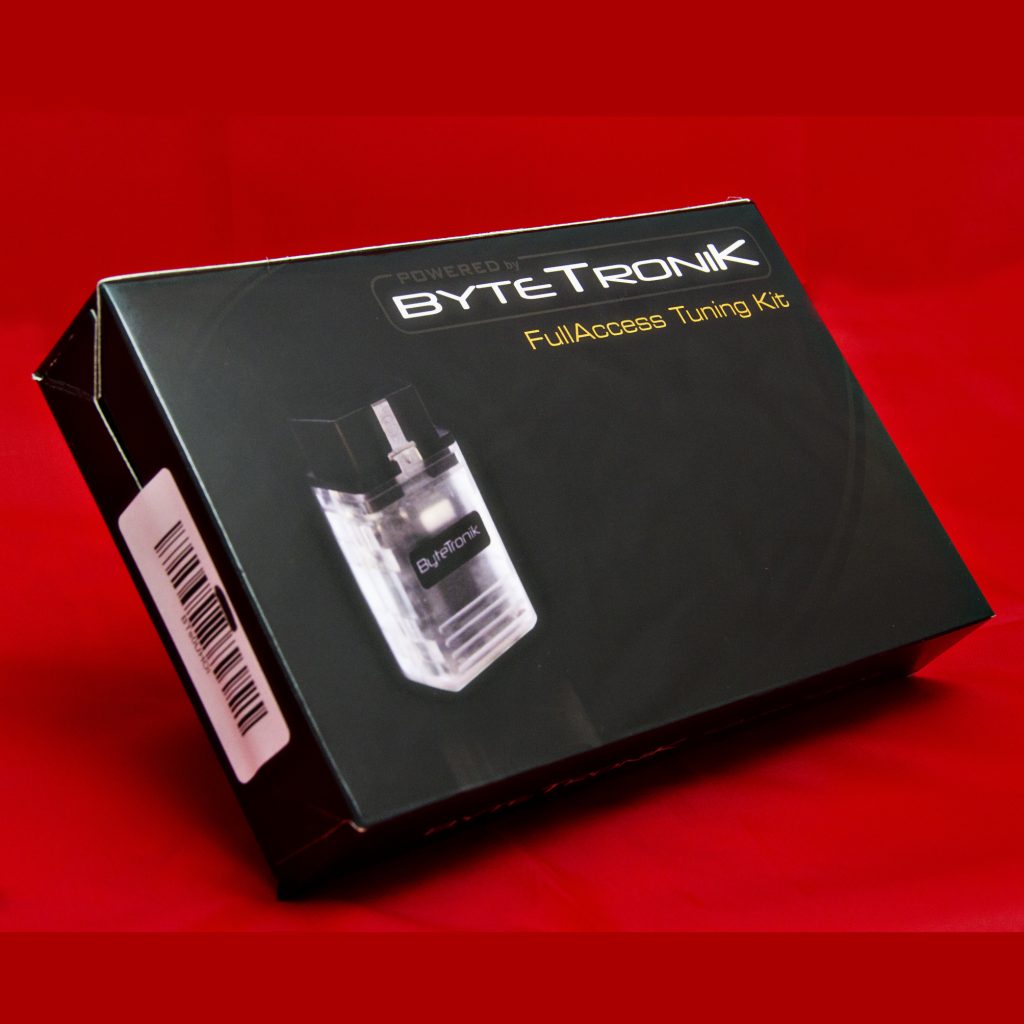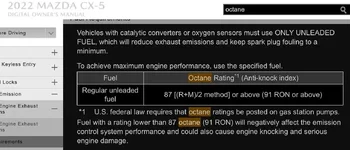You are using an out of date browser. It may not display this or other websites correctly.
You should upgrade or use an alternative browser.
You should upgrade or use an alternative browser.
Comparing 87 to 91 octane for the 2.5L non-turbo engine
- Thread starter erhayes
- Start date
- :
- 2015 Mazda CX-5 Touring FWD
I noticed no difference in power or fuel economy while running a couple tankful's each of Premium, and alcohol free gas through my 2015 Touring. Save the extra dollars, stick with regular.
- :
- CX5 GT
mazda now claims 91 is recommended. In the past I dont recall such recommendation.If the owners manual doesn't specifically say you need to run 91, than 87 will be perfectly fine.
The only thing the higher octane rating does is prevent knock and pinging.
dont know why. My experience with 91 and CX5 NA is that the car felt more responsive in then summer heat but that may be subjective.
What is objective is that the knock/retarding of advance was better with 91 as monitored form the obd. But that doesnt mean it wont run on 87.
Alcohol free is best if one can find it nowadays.
CarpeDiem
Under Pressure
- :
- Superstitions
- :
- 2021 CE Turbo
mazda now claims 91 is recommended…
Where is this recommended by Mazda?
Attachments
- :
- CX5 GT
2023 spec. May be its the Ron91 ?Where is this recommended by Mazda?
Jack Rabbit
Banned
- :
- 18 Mazda CX5 AW
Alcohol free should have gotten you better gas mileage. Real gas burns with more BTU's per ounce than mix does, so the engine wouldn't have to burn as much to maintain the same speed.
This is true but...
Unless you drive like a grandma , soft on pedal, flat roads, and all highway miles, and you actually track you mileage and calculate your mpg than most people will not notice the difference.
How you drive, f.i. stomping on the gas pedal will affect your mpg far more so than e85 versus the real stuff.
Also some top gasoline e85 performs better and may only be a slight decrease in mpg when using certain brands.
So e85 will always get less fuel efficiency but overall, you may not notice much depending on your driving habits. The OP probably hasn't noticed much difference because other factors affect mpg as well.
And at the end of the day, the e85 should be cheaper so $$ wise, it all balances out.
It soon won't matter as real gasoline is quickly becoming the elusive purple unicorn.
There is no real gas on my commute to work and to get pure gas for my lawnmower requires traveling 30 minutes (out of my way) in opposite direction from my house. If this station stops selling pure, will be hard pressed to find another location.
Last edited:
- :
- South Carolina
- :
- 21 CX-9 13 CX-5
Pure-gas.org - ethanol-free gasoline in the U.S. and Canada
Pure-gas.org is the definitive web site listing stations that sell pure gasoline in the U.S. and Canada.
Jack Rabbit
Banned
- :
- 18 Mazda CX5 AW
Nice list. Thanks for posting link. So if my gas station(thats 30 minutes away) stops selling pure, then i'll have to travel an hour away for my lawnmower gas. Yep, couple years from now, itll all be e85.Pure-gas.org - ethanol-free gasoline in the U.S. and Canada
Pure-gas.org is the definitive web site listing stations that sell pure gasoline in the U.S. and Canada.www.pure-gas.org
HyFlyer
2019 CX5 sig 2.2 diesel / 2016.5 CX5 touring 2.5na
- :
- Southwest Ohio
... There is no real gas on my commute to work and to get pure gas for my lawnmower requires traveling 30 minutes (out of my way) in opposite direction from my house. If this station stops selling pure, will be hard pressed to find another location.
It is possible to remove the ethanol from the fuel yourself as needed for your small engines (or any engine) fairly easily. All you need is a container, some water and a way to drain or siphon off the bottoms. Add water to the fuel, shake it up, the ethanol absorbs the water and separates out dropping to the bottom. Then drain or siphon that out and you now have 100% pure gas
You can also use the same procedure to test what percentage of ethanol is in a fuel, if any.
clownshoes2
2017 CX-5 GT No Tech - 2023 CX-30 GT NA
- :
- CX-5
To OP:
You're going to get furious debate on here about this issue. You'll get all the pseudo scientists trotting out all the documentation in the world showing that there is no difference in using 87 vs. 91.
Then you'll get all the pseudo scientists trotting out all the documentation in the world showing that 91 vs 87 is better.
Go with what you feel and experience as neither fuel will damage your vehicle.
My experience is that my 2017 CX-5 runs noticeably better on 91, and even better on 94 octane fuels. I also get approx 50kms more distance per tank. That's my experience.
Do what YOU feel is best. It is YOUR vehicle after all.
You're going to get furious debate on here about this issue. You'll get all the pseudo scientists trotting out all the documentation in the world showing that there is no difference in using 87 vs. 91.
Then you'll get all the pseudo scientists trotting out all the documentation in the world showing that 91 vs 87 is better.
Go with what you feel and experience as neither fuel will damage your vehicle.
My experience is that my 2017 CX-5 runs noticeably better on 91, and even better on 94 octane fuels. I also get approx 50kms more distance per tank. That's my experience.
Do what YOU feel is best. It is YOUR vehicle after all.
Conrad 16.5
Banned
- :
- 2016.5 CX-5 GT AWD titanium/black 2016 Miata Club ST MT white
It is possible to remove the ethanol from the fuel yourself as needed for your small engines (or any engine) fairly easily. All you need is a container, some water and a way to drain or siphon off the bottoms. Add water to the fuel, shake it up, the ethanol absorbs the water and separates out dropping to the bottom. Then drain or siphon that out and you now have 100% pure gas
You can also use the same procedure to test what percentage of ethanol is in a fuel, if any.
100% pure gas? What happens to the water that isn't absorbed by the ethanol?
Conrad 16.5
Banned
- :
- 2016.5 CX-5 GT AWD titanium/black 2016 Miata Club ST MT white
This is true but...
Unless you drive like a grandma , soft on pedal, flat roads, and all highway miles, and you actually track you mileage and calculate your mpg than most people will not notice the difference.
How you drive, f.i. stomping on the gas pedal will affect your mpg far more so than e85 versus the real stuff.
Also some top gasoline e85 performs better and may only be a slight decrease in mpg when using certain brands.
So e85 will always get less fuel efficiency but overall, you may not notice much depending on your driving habits. The OP probably hasn't noticed much difference because other factors affect mpg as well.
And at the end of the day, the e85 should be cheaper so $$ wise, it all balances out.
It soon won't matter as real gasoline is quickly becoming the elusive purple unicorn.
There is no real gas on my commute to work and to get pure gas for my lawnmower requires traveling 30 minutes (out of my way) in opposite direction from my house. If this station stops selling pure, will be hard pressed to find another location.
You seem to be talking about e85 as if it's the 'normal' ethanal laced gas at the pump, it's not. Check the pumps, there's 'normal' ethanal laced gas (~10%) and then there's e85. In most cases (if not all) the engine has to be designed/tuned to run on e85.
- :
- South Carolina
- :
- 21 CX-9 13 CX-5
Right, because E85 is corrosive, and it only has a greatly diminished power capability per ounce of fuel compared to gasoline.
Understand that higher octane numbers absolutely does NOT mean more power. This is often misunderstood. The only thing higher octane does is reduce knock and pinging, which allows you to change ignition timing. The timing change can effect power, but not nearly so much as to offset the power losses of running ethanol vs pure gasoline.
Understand that higher octane numbers absolutely does NOT mean more power. This is often misunderstood. The only thing higher octane does is reduce knock and pinging, which allows you to change ignition timing. The timing change can effect power, but not nearly so much as to offset the power losses of running ethanol vs pure gasoline.
Where do you get your information from? I realize that you may think this but every performance ECU tuner in the world has warnings for using some preset ECU tunes for use with 91 or 93 octane fuels or chance causing engine damage. I do believe that you would be hard pressed to find forums that guys show their best DYNO results using anything but 91,93 or higher-octane fuels. So I am wondering if this is a personal belief you have or something you read? I do agree that this is so often misunderstood.Understand that higher octane numbers absolutely does NOT mean more power. This is often misunderstood. The only thing higher octane does is reduce knock and pinging, which allows you to change ignition timing. The timing change can effect power, but not nearly so much as to offset the power losses of running ethanol vs pure gasoline.
The Predator 2 Platinum, PN 7210, does include custom tuning capability and additional power levels for 93 octane fuel on some applications.
93US/98EU Octane tune for CPE CAI and Corksport catless race pipe. !!! HPFP upgrade required !!! 6900 rev limit

Full Access Tuning Kit R53 - Bytetronik INC
FullAccess Tuning kit, MINI R53, Turbo, ECU Tuning, ECU Remap, Custom Remap, FA53, Cooper-S, Reflash
There are countless more, but I will say these are all performance references. I will support that if you drive without a load factor to any degree and live in an area that is for the most part flat and the temperatures seldom vary between 45F and 100F throughout the year then I can see the reasonable choice not to use -91+ octane fuel.
On the subject of small engines and octane of using oxygenated fuels, just add Xylene to the gasoline you use it will up the octane and run cleaner even if you use fuels from say Kalifornia. ahaha!
New Posts and Comments
- Replies
- 9
- Views
- 208
- Replies
- 1
- Views
- 90
- Replies
- 14
- Views
- 1K
- Replies
- 6
- Views
- 1K
- Replies
- 4
- Views
- 871

